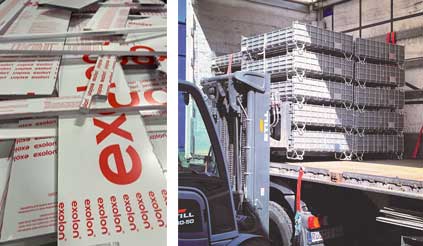Recycling: Exolon Group/Pekutherm tie-up recycling for thermoplastics; Zeon constructs COP recycling plant in Japan

The demand for sustainable products in the plastics industry is growing by leaps and bounds. To meet this demand, a manufacturer of polycarbonate sheet – Exolon Group – has launched the 'Closing the loop' project. Customers of Exolon will have a suitable recycling partner for offcuts and waste material as part of the purchase of new material: Germany-based recycling company for acrylic glass (PMMA) and PC Pekutherm, which has been implementing a collection and recycling concept for thermoplastics for years.
"We want to make a significant contribution to the recycling economy and continue to expand our own product portfolio with recycled components. With the Ecorange range of multi-skin and solid sheets, to which we have recently added the rECO and rECOplus sheet types, we are massively reducing our ecological footprint. But we wanted to go one step further: Any of our customers can request collection boxes for used material and offcuts from our partner Pekutherm and use these deliveries to supply the raw material required for our 'closing the loop' project," says Wim Van Eynde, Head of Product Management at the Exolon Group.
Years ago, Pekutherm, a company specialising in plastics recycling, developed an independent and manufacturer-independent recycling system for thermoplastics such as acrylic glass (PMMA) and polycarbonate (PC), which is now available as a partner programme for plastics processors. "The material is collected directly from the processor of thermoplastic semi-finished products. We provide the necessary collapsible and space-saving collection containers called Ecoboxes. We collect those with our own logistics, the suppliers are even paid for the quantity. We then sort the contents, process and granulate it at our plant. In this way, we meet the purity requirements for a closed-loop process. We supply the granulate to manufacturers such as the Exolon Group, who can then produce new material with significantly less impact on the environment," explains Heiko Pfister, Managing Director of Pekutherm.
At Exolon, different amounts of recycled material are added depending on the panel material: at least 40% regrind is used in the previous sustainable ECO panel types, while the solid rECO panels consist of 50 to almost 100% pre-consumer waste. Here, for example, offcuts from processors are used to improve the eco-balance of new products.
Exolon uses recycled material from post-consumer waste for its rECOplus polyester sheets. The sheets contain 25% polyester from products that have reached the end of their life and have been processed into new granules. More and more manufacturers are turning to the high-quality recyclates supplied by Pekutherm. The company has therefore significantly expanded its processing capacity. The unmixed granulate of thermoplastics such as acrylic glass or polycarbonate is processed into new products of the same quality by manufacturers such as Exolon and others, with less environmental impact and CO2 emissions. This is confirmed by an annual certificate showing the amount used and the CO2 emissions avoided.
Partners can also display a recycling seal for the Pekutherm partner programme, demonstrating to the outside world their participation in the initiative to protect the environment.
"With our partner programme, we want to enable the industry – manufacturers and processors – to benefit from environmental protection without having to make significant investments in their own collection concepts. And the CO2 savings are immense: for every 100 tonnes of recycled material used, almost 500 tonnes of CO2 can be saved," explains Heiko Pfister of Pekutherm.

In other news, Japan’s Zeon Corporation has completed construction of a recycling plant for cyclo olefin polymers (COP; product names: Zeonex and Zeonor) at its Takaoka Plant (Takaoka City, Toyama Prefecture). Zeon says it is set to begin recycling its own products for the first time, while the new plant will not only further differentiate Zeon’s COP products but also contribute to the realisation of a sustainable society by reducing CO2 emissions. The plant will have a production capacity of 6,000 tonnes/year.
The new plant, construction of which began in the summer of 2022, will recycle waste resin generated when processing COP into film. COP film (product name: ZeonorFilm) is widely used as retardation film for displays, taking advantage of properties such as excellent optical stability and low water absorbency.
For this reason, recycled resin to be used as raw material must be as high in quality as original resin, which had been difficult for conventional recycling technologies to achieve and maintain transparency and high purity.
Zeon adds its groundbreaking technology has made it possible to produce recycled resin with the same level of quality as original resin. Zeon plans to reuse the recycled resin to manufacture optical films in response to the robust demand that is expected to continue.
(PRA)SUBSCRIBE to Get the Latest Updates from PRA Click Here»




